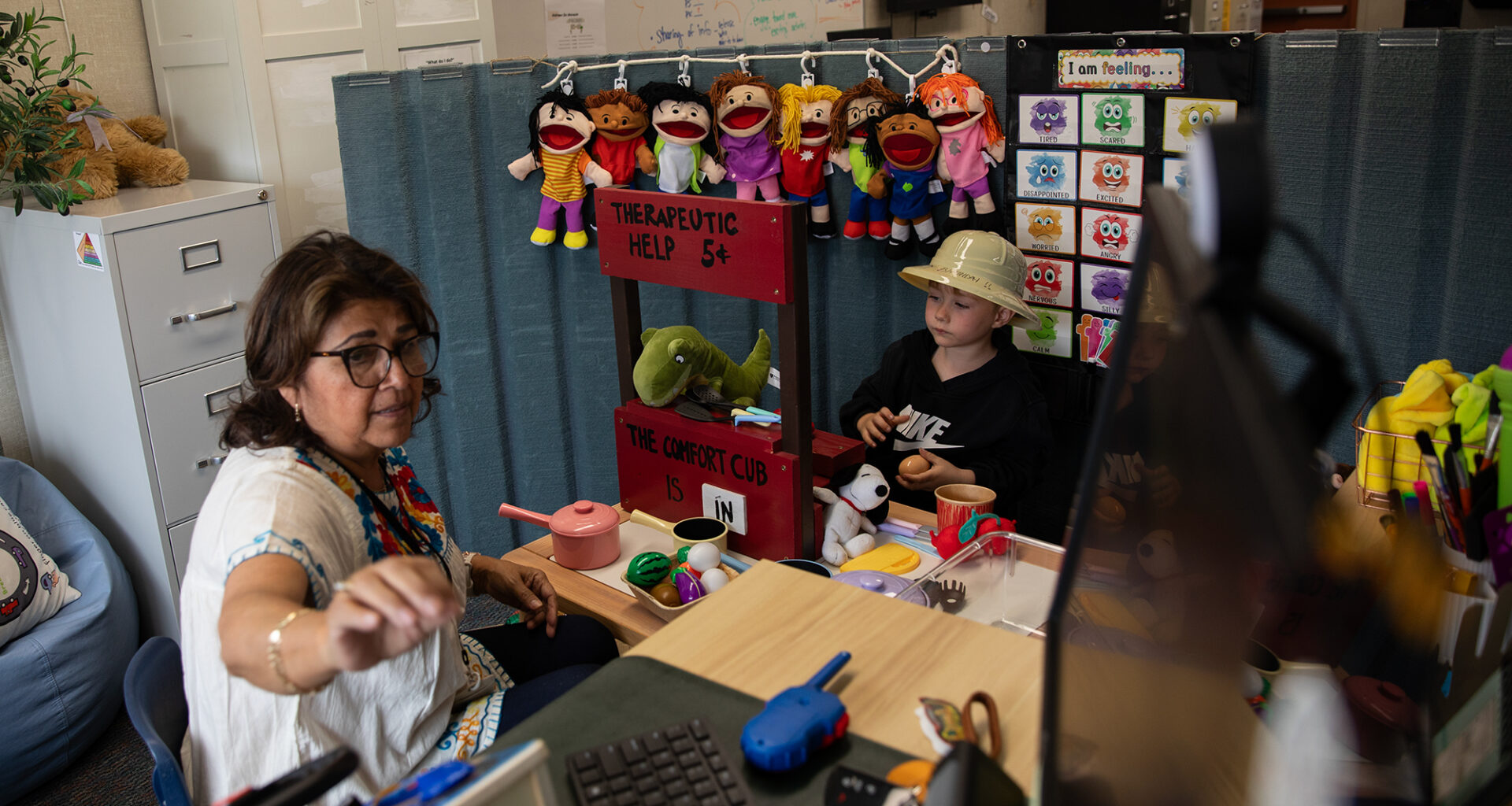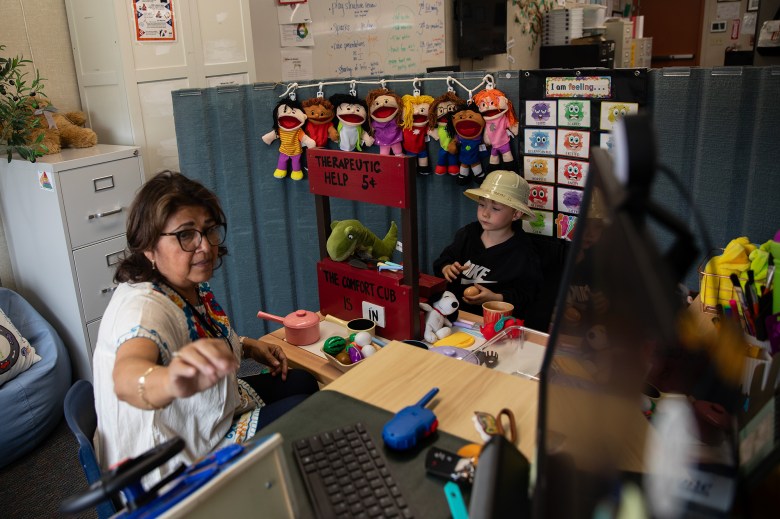 Clinical Supervisor Angelina Puffelis and a student play during a one-on-one therapy session at Mi Escuelita in San Diego on May 5, 2025. Photo by Adriana Heldiz, CalMatters
Clinical Supervisor Angelina Puffelis and a student play during a one-on-one therapy session at Mi Escuelita in San Diego on May 5, 2025. Photo by Adriana Heldiz, CalMatters
For many young Californians, preschool is a place to run around, sing songs and develop early social skills. But for those enrolled in one San Diego program, preschool could also mean speaking to a mental health therapist, processing trauma and learning emotional regulation.
As CalMatters’ Adriana Heldiz explains in a visual essay, Mi Escuelita is a preschool dedicated to students who have experienced family trauma, including domestic violence. Last year, 28 parents of 84 students enrolled in Mi Escuelita reported having been involved in multiple domestic violence relationships.
The school offers students on-site mental health services, such as one-on-one sessions with clinicians, as well as group therapy where students learn about feelings and how to regulate them. Therapists interact with students through play, and keep an eye out for clues of deeper emotional issues bubbling up.
Angelina Puffelis, clinical supervisor at Mi Escuelita: “Usually there is a theme and some of the things that are common are protection, safety, empowerment or the superhero; bad and evil. So as a therapist, I look for that. This is a continuum theme and if there’s changes in the home environment, that theme plays out in play therapy.”
Though the cost of operating Mi Escuelita is $1.3 million a year, students attend Mi Escuelita for free and classes are offered year-round. Founded in 2006, Mi Escuelita is regarded as a leader among therapeutic preschools, offering insight to the benefits of a trauma-informed learning environment. A recent UC San Diego report found that 82% of Mi Escuelita students scored above average on the Kindergarten Readiness Test — meaning those students have “no major learning difficulties.”
Read more here, and if you’re short on time check out the main takeaways.
More on childhood trauma intervention: Adriana and CalMatters’ Adam Ashton also spoke with the executive director of First Five California, an organization that supports early learning services in the state, to develop a guide for families looking for assistance after trauma. Read it here.
🗓️ CalMatters Events in your community
San Jose: Join CalMatters and Alianza News on Friday for a screening of Operation: Return to Sender, a short documentary uncovering what happened during a Border Patrol raid in Bakersfield. After the film, CalMatters’ Sergio Olmos and others will discuss what the team uncovered. Register.
Stockton: Hear from some of the candidates running for governor at the California Economic Summit’s Governor Candidate Forum on Oct. 23. CalMatters, California Forward and 21st Century Alliance are co-hosting the discussion. Register.
Other Stories You Should Know
Inaccurate directories haunt patients
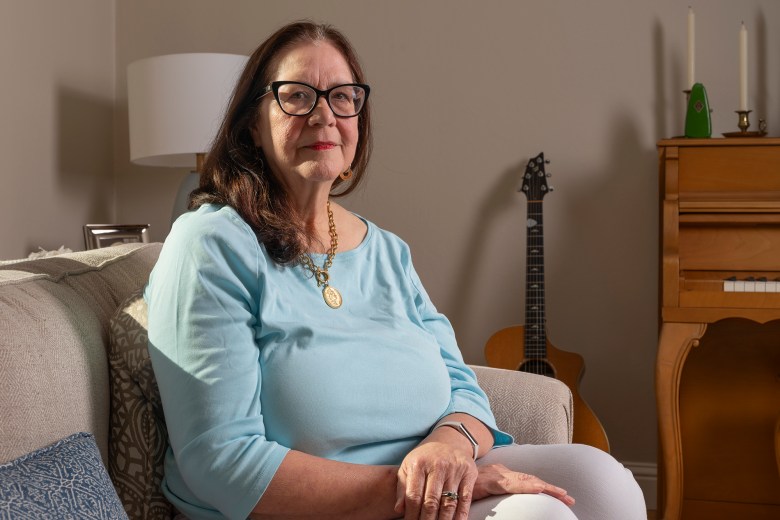 Mary Kuhn at her home in Lafayette on Oct. 10, 2025. Photo by Jungho Kim for CalMatters
Mary Kuhn at her home in Lafayette on Oct. 10, 2025. Photo by Jungho Kim for CalMatters
After being diagnosed with a hernia that occurs through an opening in the diaphragm — a potentially fatal condition that requires surgery — Mary Kuhn began searching for an in-network specialist who could treat her. But discrepancies arising from her health insurance’s “ghost network” underscores how Kuhn, and many patients like her, experience delays in care that could endanger their lives, writes CalMatters’ Kristen Hwang.
So-called ghost networks refer to inaccurate or outdated lists published by insurance companies that include health providers who aren’t actually in-network. For Kuhn, her physician referred her to a Walnut Creek cardiothoracic surgeon listed in Blue Shield of California’s online directory of providers. But a month before her surgery was to take place, the insurer sent her a denial letter in December 2024, refusing to pay for the surgeon’s services, stating the doctor was not in her health plan.
Kuhn: “I thought that’s a mistake. Of course he’s in-network, I see him there.”
Though California passed a law in 2015 to make it easier for patients to find in-network care, patients still struggle with inaccurate directories. Assemblymember Cecilia Aguiar-Curry argues that the law is underenforced, and that health plans have “no incentive” to fix the problem. Though the Davis Democrat introduced a bill to require directories to be 95% accurate by 2029, she later withdrew it, and says she plans to revive the measure next year.
Former physician seeks to unseat Republican
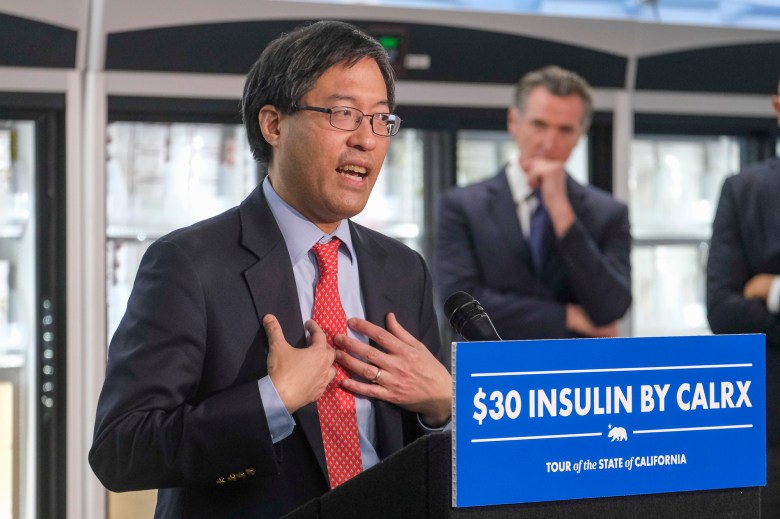 Former state Sen. Richard Pan speaks at a news conference in Downey on March 18, 2023. Photo by Ringo Chiu, AP Photo
Former state Sen. Richard Pan speaks at a news conference in Downey on March 18, 2023. Photo by Ringo Chiu, AP Photo
Former Democratic state Sen. Richard Pan is running to unseat U.S. Rep. Kevin Kiley, a Republican who finds himself newly vulnerable should voters pass Proposition 50 in November, writes CalMatters’ Maya C. Miller.
Pan said he is running for congress because he wants to make the government “work for people” again. The Sacramento physician successfully pushed for a 2015 state law requiring stronger immunization protections for children, and faced immense pushback from anti-vaccine activists and Robert F. Kennedy Jr., the current U.S. Health and Human Services Secretary.
Pan, in an interview with CalMatters: “We see a federal government that seems to be intentionally attacking health care, whether it’s taking away people’s health insurance, undermining public health to allow disease to spread, cutting research for things like cancer treatments.”
Since 2023, Kiley has represented California’s 3rd Congressional District. Kiley is an outspoken critic of Gov. Gavin Newsom and opposes Prop. 50. If the district changes under the measure, Pan would have previously represented about 70% of voters who live in that new district, according to his campaign.
And lastly: A hole in the theory
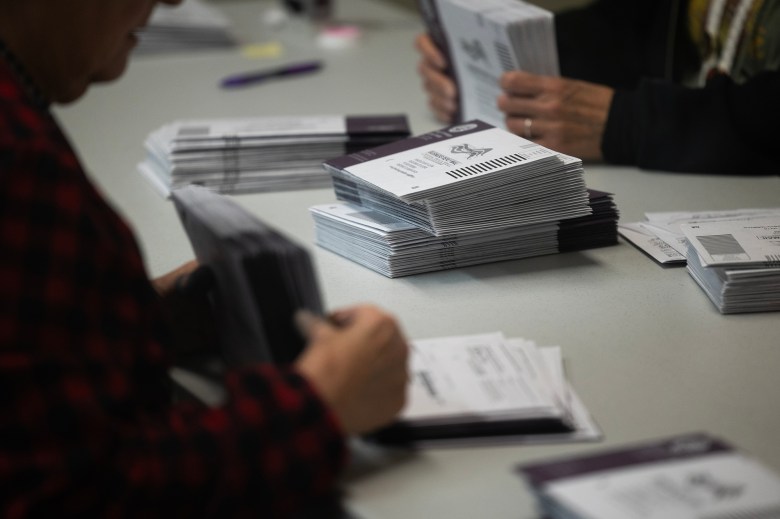 Election workers process ballots at the Shasta County Clerk Registrar of Voters office in Redding on Oct. 30, 2024. Photo by Miguel Gutierrez Jr., CalMatters
Election workers process ballots at the Shasta County Clerk Registrar of Voters office in Redding on Oct. 30, 2024. Photo by Miguel Gutierrez Jr., CalMatters
On Monday California Secretary of State Shirley Weber addressed the growing conspiracy theory that a small hole on the ballot return envelopes for November’s special election was designed to reveal a person’s vote on Prop. 50 — the only measure on the ballot.
Weber said the hole is for “sight-impaired voters to orient themselves” when they sign the envelope. If voters have privacy concerns, they can place their ballots inside the envelope in a way that does not make their markings visible, or vote in person. Similar theories spread during Newsom’s recall election in 2021.
California Voices
CalMatters columnist Dan Walters: Despite Newsom pledging to lead efforts to develop millions of new housing units, and signing multiple bills to speed up construction, housing production in California did not substantially increase during his governorship.
Acts of protest from detained immigrants — such as the hunger strikes in California’s El Centro Immigration Detention Facility — have never stopped, and will likely continue under President Donald Trump’s second administration, writes Jessica Ordaz, associate professor of ethnic studies at the University of Colorado Boulder.
Other things worth your time:
Trump targets Democratic districts by halting billions during shutdown // The New York Times
Federal shutdown stalls legal battles between CA, Trump administration // Los Angeles Times
CA joins bicoastal governors’ alliance to shore up public health // The Sacramento Bee
Supervisors unanimously condemn Shasta election official’s decision to restrict press access // Shasta Scout
A pregnant Amazon employee in CA asked for a chair to sit on — and wound up homeless // Mother Jones
Trump’s top federal prosecutor in LA faces challenge over ‘acting’ status // Los Angeles Times
LA County declares a state of emergency due to immigration raids // Los Angeles Daily News
.wp-block-group__inner-container > :not(h2){margin: 16px 40px !important;}.cm-cta.long-ask .wp-block-group .wp-block-group__inner-container{display: flex;gap: 12px;align-items: center;}.cm-cta.long-ask figure{max-width: 40px;flex-shrink: 0;}.cm-cta.long-ask .wp-block-group p{font-size: 18px;font-weight: 700;line-height: 120%;letter-spacing: -0.36px;width: 100%;}.cm-cta.long-ask .wp-block-group .wp-block-buttons{flex-shrink: 0;}.cm-cta.long-ask .wp-block-button__link{padding-left: 40px;padding-right: 40px;}@container long-ask (min-width: 601px){.cm-cta.long-ask *{font-size: 16px;}}@container long-ask (max-width: 600px){.cm-cta.long-ask h2,.cm-cta.long-ask .wp-block-group p{text-align: center;}.cm-cta.long-ask h2{background: linear-gradient(90deg,#FFE094 0%,#FFB500 100%);padding: 12px 20px;font-size: 20px;letter-spacing: -0.4px;}.cm-cta.long-ask .wp-block-group .wp-block-group__inner-container{flex-direction: column;}.cm-cta.long-ask > .wp-block-group__inner-container > :not(h2){margin: 16px 20px !important;}}]]>
Nonpartisan, independent California news for all
We’re CalMatters, your nonprofit and nonpartisan news guide.
Our journalists are here to empower you and our mission continues to be essential.
We are independent and nonpartisan. Our trustworthy journalism is free from partisan politics, free from corporate influence and actually free for all Californians.
We are focused on California issues. From the environment to homelessness, economy and more, we publish the unfettered truth to keep you informed.
We hold people in power accountable. We probe and reveal the actions and inactions of powerful people and institutions, and the consequences that follow.
But we can’t keep doing this without support from readers like you.

Please give what you can today. Every gift helps.
Lynn La is the newsletter writer for CalMatters, focusing on California’s top political, policy and Capitol stories every weekday. She produces and curates WhatMatters, CalMatters’ flagship daily newsletter…
More by Lynn La

